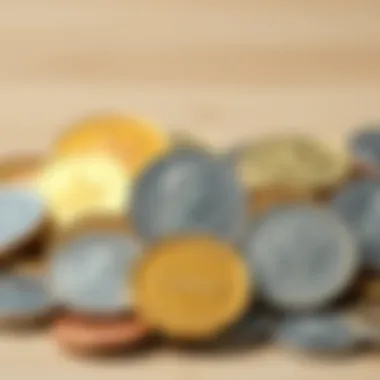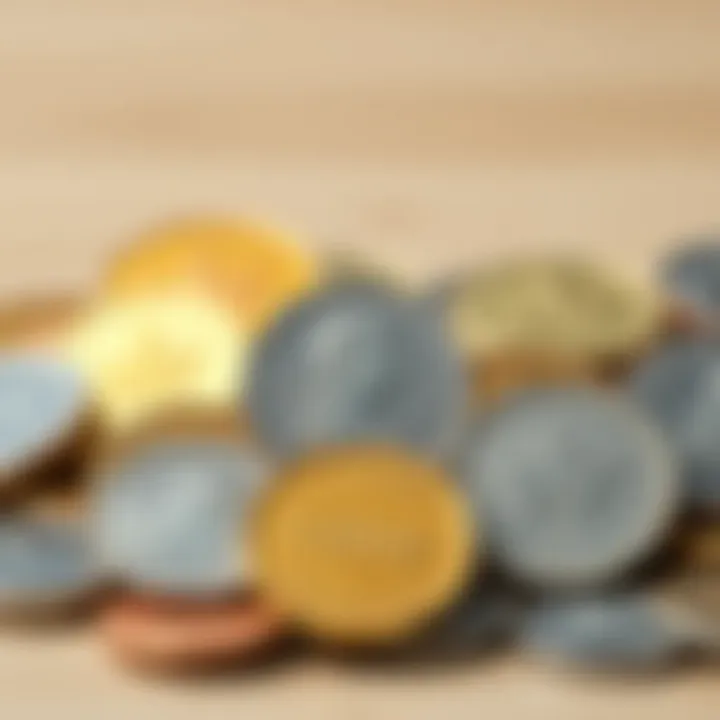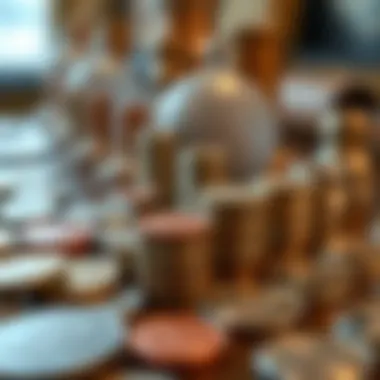Understanding Canadian Coin Exchange Methods


Intro
Canadian coin exchange is a realm that many might find perplexing at first glance. However, by digging deeper into this fascinating subject, one can uncover immense potential not just for collectors, but also for those looking to bolster their investments or simply make a few savvy financial choices. In this article, we will take a methodical approach to demystify Canadian coins, exploring their types, historical context, and the myriad of ways to exchange them effectively.
As we navigate through this terrain, we’ll touch on the implications that coin exchange can have on personal finances, investment opportunities, and collector communities. Not merely a matter of flipping coins, but rather understanding their value, historical significance, and the current market dynamics that operate around them.
Whether you're an enthusiastic novice or an experienced investor, this guide endeavors to enrich your awareness, equip you with keen insights, and ultimately enhance your engagement with currency. Let's embark on this enlightening journey together.
Investment Terminology
Understanding the lingo is half the battle when it comes to navigating the world of coin exchanges. Whether you’re trading in rare coins or simply trying to get a better grasp on your financial decisions, knowing key terms can make or break your strategy. Here are some important terms to familiarize yourself with:
Key Terms and Definitions
- Appreciation: The increase in the value of a coin over time, often driven by demand and rarity.
- Liquid Assets: Coins that can be sold quickly without losing much of their value, making them easily convertible into cash.
- Condition Grading: A system used to evaluate the physical state of a coin, influencing its market price significantly.
- Bullion Coins: Coins made primarily from precious metals, valued for their metal content rather than as legal tender.
- Numismatics: The study or collection of currency, including coins, tokens, and paper money.
Common Acronyms in Finance
- ROI (Return on Investment): A measure used to evaluate the efficiency of an investment, particularly relevant in assessing the profitability of coin collection.
- NGC (Numismatic Guaranty Corporation): A recognized grading service that provides authentication and grading for coins to protect collectors.
- PCGS (Professional Coin Grading Service): Another well-known grading service, crucial for establishing the value and authenticity of coins.
"The right terminology can demystify the seemingly complex world of coins, turning uncertainty into informed decision-making."
With a better understanding of these essential terms and acronyms, you’re well on your way to making informed decisions in the world of Canadian coin exchange.
Stay tuned as we delve deeper into the historical context behind these coins, the various methods of exchange, and expert insights into investment strategies.
Understanding Canadian Currency
Understanding the intricacies of Canadian currency is not just of academic interest but plays a significant role in the practical realm of coin exchange. Grasping the historical and cultural context behind the coins can greatly enhance one's appreciation and savvy in handling these pieces of metal. In a country like Canada, with a rich tapestry of history and cultural influences, coins become more than mere currency—they emerge as symbols that echo the stories of its people.
Why is Understanding Currency Important?
- Connection to History: Coinage often mirrors pivotal moments in national history. Knowledge of these stories provides insights into how monetary values have shifted over time.
- Informed Decision Making: Understanding the features of Canadian coins equips both collectors and investors to make sound decisions when trading or acquiring coins. A well-informed individual is less likely to fall prey to common misconceptions or scams.
- Cultural Reflection: The designs and denominations used in Canadian coins are reflective of the nation's identity and values, encapsulating wildlife, historical figures, and key cultural references. Recognizing these elements can deepen one's connection to the currency.
The Evolution of Canadian Coins
The journey of Canadian coins is steeped in a myriad of historical transformations. From issues of early indigenous trade to contemporary minting practices, the evolution of these coins is a narrative woven with diversity and change.
Initially, Canada relied on foreign currencies and barter systems, as local economies were interlinked with trade. Following Confederation in 1867, Canada sought to establish its own system of currency. The British North America Act of 1867 allowed the government to create its own monetary system, leading to the first Canadian penny minted in 1858.
Over decades, Canadian coins have morphed significantly in design and composition. For instance, the introduction of the small cent in the 1920s marked a transition towards more practical, everyday coinage. There’s been a notable shift from physical metals to more cost-effective materials, affecting the durability and aesthetic of coins.
Recent years have ushered in the use of modern technologies in minting, allowing for intricate designs and security features. Coin design has also adapted to global trends and technological advancements, while simultaneously celebrating national milestones.
Coins as a Reflection of National Identity
Coins serve not only as mediums of exchange but also as cultural artifacts that encapsulate a nation’s identity. Canadian coins are vivid reflections of the country's societal values and historical narratives.
- Symbolism in Design: Each coin often features motifs representing Canada’s rich geography—such as the iconic beaver or the maple leaf—thereby promoting a sense of national pride and unity.
- Historical Figures: Coins have honored pivotal Canadian figures, from explorers like John Cabot to political icons such as Prime Minister Pierre Trudeau. This not only educates the public about their contributions but also fosters appreciation for the nation’s past.
- Commemoration of Events: Special edition coins often mark significant events, like the 150th anniversary of Canada's Confederation, bridging gaps between generations and reminding citizens of collective heritage.
"Coins are the history of a nation, captured in metal and design, a small yet potent reminder of who we are."
In essence, understanding Canadian currency offers a multi-faceted view into the economy, history, and identity of Canada as a whole. This foundational knowledge is integral for anyone keen on navigating the landscape of Canadian coin exchange.
Types of Canadian Coins
Understanding the different types of Canadian coins is a cornerstone of engaging in coin exchange. These coins serve not only as a medium of exchange but also as a representation of Canada’s values, history, and identity. Knowing the various categories can provide insights into market dynamics, enhance the collecting experience, and drive strategic investments. This section will delve deep into circulating coins, collector coins, and commemorative coins. Each type has its unique advantages and challenges, making it crucial for both novice and seasoned investors to grasp these nuances thoroughly.
Circulating Coins: An Overview
Circulating coins are the backbone of everyday transactions in Canada. Ranging from the iconic penny to the sturdy toonie, these coins are designed for practicality, ensuring they withstand the rigors of daily use. The denominations include 5 cents, 10 cents, 25 cents, 1 dollar, and 2 dollars. Each of these coins carries an intrinsic value, tied to its metal composition and popularity in commerce.


One important point to note is that while these coins are readily available, their value can fluctuate based on market demand. For instance, older coins or those with unique features might command higher prices among collectors. Furthermore, identifying niche markets can become a profitable venture, as some circulating coins become more sought after due to their rarity or condition.
Key features of circulating coins include:
- Widely Used: They are used in daily transactions, making them easily accessible for most people.
- Material Composition: Modern coins are typically made from a combination of nickel and copper, affecting their longevity and collectibility.
- Design Changes: Regular updates to designs reflect Canada's evolving cultural landscape.
Collector Coins and Their Value
Collector coins, on the other hand, are designed with enthusiasts in mind. Unlike their circulating counterparts, these coins are often produced in limited quantities, making them more appealing to those looking to invest or complete a collection. They can be silver, gold, or even platinum, each carrying not just numismatic value but also metallurgical worth.
The value of collector coins is influenced by several factors: rarity, condition, and historical significance. For instance, a rare edition of a collector coin celebrating Canadian wildlife could be worth significantly more than its face value, primarily due to its limited release and the interest of collectors.
Collectors often turn to resources like Canadian Coin News or related forums on Reddit to assess market trends and authenticate their coins. Occasionally, the sheer aesthetic appeal of these coins—often featuring intricate designs or engravings—can motivate purchases beyond financial investments.
Important considerations in collector coins:
- Market Trends: Stay updated with the latest trends in the coin community to understand what may rise in value.
- Authenticity: Ensure coins are authenticated by trusted numismatic experts to prevent fraud.
Commemorative Coins: Significance and Market
Commemorative coins represent a unique blend of history and artistry, often celebrating significant events, anniversaries, or cultural milestones within Canada. These coins are typically issued for a limited time, generating immediate interest among collectors and investors alike. The significance of these coins often transcends their monetary value.
For example, coins released to honor the 150th anniversary of Canadian Confederation not only hold a face value but also an emotional and historical weight. As a result, demand often outstrips supply in the initial release phase, creating opportunities for profit in the secondary market.
These coins provide a gateway for newcomers to the world of collecting, as they often have educational themes or storytelling aspects linked to Canada’s rich heritage.
Characteristics of commemorative coins include:
- Short-Term Production: Limited minting runs increase desirability and potential resale value.
- Cultural Reflection: Holds cultural relevance, often commemorating icons or important milestones.
- Investment Potential: Many view them as a way to diversify their investment portfolios.
By understanding these types of Canadian coins, participants in the coin exchange landscape can make informed decisions that not only enhance personal collections but can also yield significant financial returns. Familiarity with circulating coins, collector coins, and commemorative coins will undoubtedly enrich the experience of individuals navigating through the Canadian coin market.
Exchanging Coins: Processes and Methods
Understanding how to exchange coins is fundamental for anyone interested in the nuances of currency in Canada. Not only does it encompass the act of converting coins into cash or other products, but it also magnifies the importance of being informed about the myriad of methods available. Whether you’re a newbie looking to convert pocket change or a seasoned collector wishing to trade rare coins, having a grasp on the processes and methods of coin exchange makes a world of difference.
This section will illuminate three key methods of exchanging coins—each with its unique benefits and considerations. By understanding these avenues, you empower yourself and navigate the sometimes murky waters of coin exchange with confidence. Let's unpack these methods.
Traditional Methods of Exchange
For many, the age-old way of exchanging coins is still a favorite. Traditional methods include local banks, currency exchanges, or simply trading coins amongst friends.
- Local Banks: Banks often offer coin exchange services, allowing you to trade your coins for cash. While this is convenient, it can sometimes come with limitations on the amount you can exchange at once.
- Personal Trading: This is as simple as swapping coins with friends or fellow collectors. Not only is it often more efficient, but also a way to foster community ties.
- Coin Shows: Events like these connect like-minded individuals who may wish to exchange coins in a vibrant environment.
Each of these methods offers distinct advantages, but they also have drawbacks. For instance, while banks can provide instant cash, the fees might nibble away at your haul. In contrast, personal trading comes with the risk of unequal exchanges if not valuated correctly. Therefore, gaining clarity on your coins’ worth is essential.
Modern Digital Platforms for Coin Exchange
With the advent of technology, the landscape of coin exchange has taken a sharp turn. Digital platforms now offer expedient ways to trade coins from the comfort of your home. Platforms like eBay, Facebook Marketplace, and specific coin trading websites have reshaped how people view coin exchanges today.
- Ease of Use: Navigating online platforms is typically straightforward. Most sites guide users through the listing, buying, and selling processes.
- Wider Audience: By utilizing online platforms, sellers can reach interested buyers beyond geographic boundaries.
- Market Insights: Digital platforms often present valuable market data, informing you of what others are selling similar coins for and helping you set reasonable prices.
However, users must be cautious. The world of digital exchanges is not without its pitfalls—fraud and misrepresentation being foremost among them. It's wise to do your homework and utilize well-established platforms to mitigate these risks.
Utilizing Coin Dealers and Shops
Finally, working with professional coin dealers and shops presents another avenue for exchanging coins. These entities can offer expert guidance that buyers and sellers appreciate.
- Expert Appraisals: Dealers often provide assessments that help individuals understand the value of their coins. This information is vital for making informed decisions on sales.
- Trade Offers: Coin shops often allow you to trade coins in for other currency options, or simply buy your coins at a fair market rate.
- Networking Opportunities: Engaging with dealers helps you tap into the wider community of collectors and enthusiasts.
On the flip side, relying solely on dealers can sometimes mean lower returns. Dealers need to make a profit, so be prepared for potential markups when buying or low offers when selling. Understanding the balance of cost versus value is key in these transactions.
"By understanding the various processes and methods of coin exchange, you can elevate your operations from mere transactions to financially rewarding endeavors."


For further reading on Canadian currency and exchange practices, visit Wikipedia and relevant resources from Britannica, and explore discussions on platforms like Reddit.
Happy exchanging!
Factors Influencing Coin Exchange
In the complex world of coin exchange, it’s crucial to grasp the multifaceted factors that can sway a transaction. Understanding these elements doesn’t just enrich your knowledge; it significantly enhances your ability to make informed decisions when buying or selling coins. Let’s unravel the layers of what influences coin exchange, including market dynamics, the physical condition of coins, and their historical ties.
Market Demand and Supply Dynamics
At its core, coin exchange operates on a simple yet profound principle: supply and demand. When the demand for a particular coin surges—due for reasons such as rarity, popular interest, or historical significance—the value can skyrocket. Conversely, if there are too many coins flooding the market, prices generally tend to tumble.
In Canada, this is exemplified by the interest in specific series such as the War of 1812 coins or particular editions of the loonie. For instance, a well-preserved coin from a limited mintage can command significantly higher prices than its more common counterparts. This ability to gauge market trends is indispensable for anyone involved in coin trading.
Also, keep an eye on events that can spike interest in coins. Maybe a documentary airs about the history of Canadian currency or a celebrity mentions their coin collection at an awards show. These can create a quick uptick in searching and purchasing.
- Factors to Consider:
- Recent market trends and collectibility
- External events influencing public interest
- Seasonal fluctuations in coin value
Condition and Rarity of Coins
The adage "condition is king" holds particularly true when discussing coins. A coin's grade can significantly impact its value, influencing exchange proceedings in a big way. Coins that exhibit signs of wear, scratches, or tarnish often fetch lower prices compared to those in pristine condition. Grading systems, such as the Sheldon scale, help to categorize coins, making it easier for buyers to assess their worth and choose wisely based on their investment goals.
Additionally, rarity cannot be overstated. Coins that were minted in limited quantities or possess unique features can be exceptionally valuable. With every coin that leaves circulation, scarcity comes into play; as time rolls forward, fewer and fewer uncirculated examples remain. Collectors and investors alike covet those exceptional pieces, sometimes even willing to pay exorbitant sums to secure them. Rarity creates urgency, and urgency enhances value.
Historical Significance and Narrative
Every coin tells a story, and as the saying goes, history is written by the victors. In the case of coinage, narratives embedded in the artwork, inscription, or era of minting can make a simple piece of metal worth far more than its face value. A coin commemorating a significant event, like the formation of Canada or a notable figure in Canadian history, holds intrinsic value—symbolic, cultural, and financial.
Investors benefit from understanding these narratives; they can market such coins effectively to fellow collectors or historians. Consider the 2017 Canadian $10 bill, which tells the story of women’s rights in Canada. The deeper the context, the more meaningful the coin becomes to potential buyers, hence increasing its desirability.
"The value of a coin is not only defined by its material worth but also by the stories it carries."
When engaging in the exchange of coins, one must remember that the economic landscape is ever-shifting. By keeping a pulse on market dynamics, grading practices, and historical contexts, individuals can better navigate the terrain of Canadian coin exchange.
The Economic Impact of Coin Exchange
The subject of coin exchange isn't just about the shiny metal bits people carry in their pockets or the nostalgic pieces collected in glass jars. It's a crucial thread in the fabric of personal finance and economic activity in Canada. Understanding this impact can illuminate how everyday transactions influence broader market trends and personal wealth.
Coin exchange contributes significantly to the economy in various ways:
- Liquidity: Coins facilitate smooth transactions in goods and services. When cash is at hand, it's far easier for businesses to maintain operations and for consumers to access what they need without delay.
- Investment Opportunities: Certain coins, particularly rare or collectible ones, can appreciate in value over time. This can lead to robust investment portfolios when handled wisely.
- Cultural Significance: Coins embody more than their face value; many symbolize historical narratives and national identity. The appreciation of these aspects can drive niche markets, thereby stimulating the economy.
Personal Finance and Coin Investments
In the realm of personal finance, investing in coins stands out as a unique avenue. For many, coins are not just currency but a method to expand wealth. Engaging in coin investments requires a blend of knowledge and strategy, particularly in understanding market dynamics and the value of rare pieces. Here is why investing in coins can be beneficial:
- Tangible Assets: Unlike stocks, coins provide a physical asset that retains intrinsic value. This can be particularly reassuring during economic downturns.
- Market Knowledge: Investors need to be savvy. Staying updated on trends in coin collecting, following markets, and attending conventions can yield fruitful insights.
- Diversification: Including coins in an investment portfolio helps spread risk. This diversification can be a safeguard against volatility in other markets.
- Potential Returns: While not every coin will skyrocket in value, many, particularly limited editions or those with unique historical significance, can yield impressive returns over time.
While opportunity exists, investors should be cautious, informed, and prepared for potential fluctuations in value.
Tax Implications of Coin Trading
Diving into the complexities of tax implications is essential for anyone dealing in coin exchange. The financial benefits of trading coins come with meticulous obligations to tax authorities. Here's what you should keep in mind:
- Capital Gains Tax: Profits made from selling coins that have appreciated in value are usually subject to capital gains tax. This means investors must report these earnings during tax season, which can bite into any profits made.
- Record Keeping: It’s critical to keep detailed records of purchases, sales, and valuations. This documentation can help when calculating gain or loss for tax purposes.
- Tax Laws: Each province in Canada might have specific rules governing coin investments. Understanding these regional differences is vital for compliance. Consulting a financial advisor or tax professional can provide clarity.
"Investing in coins can be rewarding, but budding investors must tread carefully to navigate the tax waters without getting caught in unintended repercussions."
Navigating the economic landscape of coin exchange can bolster your financial literacy and expand your investment knowledge. By grasping the broader economic impacts and the nuances of investments, both new and seasoned traders can make informed decisions.


Ethical Considerations in Coin Exchange
In the world of coin exchange, ethical considerations form a cornerstone that is often overlooked. Operating in a transparent manner not only builds trust within the community but also goes a long way in establishing fair practice standards among collectors and investors. When diving into the intricate dance of coin trading, being mindful of authenticity and cultural nuances helps in creating a responsible and respectful marketplace.
Authenticity and Fraud Prevention
The very heart of coin trading beats on authenticity. For seasoned investors and newcomers alike, ensuring that a coin is genuine is of utmost importance. Counterfeit coins not only devalue the market but also hurt the trust that collectors and investors place in one another. As the digital age progresses, so do the methods of deception. Sophisticated technology enables the creation of counterfeits that can mimic the weight, feel, and appearance of real coins.
What can you do to avoid being duped? Here are a few practical tips:
- Research the Coins: Knowledge is power. Before making a purchase, familiarize yourself with the specific coins you are interested in. Look at details like mint marks, design elements, and their typical market conditions.
- Use Reputable Dealers: Choosing reputable dealers with a solid track record not only ensures authenticity but also provides a safety net against fraud. Look for dealers who are members of recognized organizations.
- Third-party Grading Services: Opt for coins that have been graded and authenticated by established services like the Professional Coin Grading Service (PCGS) or the Numismatic Guaranty Corporation (NGC). This adds a layer of security in ensuring that you’re getting what you paid for.
In 2022 alone, over 10,000 counterfeit coins were identified, highlighting the pressing need for vigilance. By taking these steps, collectors uphold ethical standards while protecting the integrity of the coin exchange landscape.
Cultural Sensitivity and Coins
Coins do more than just serve as a currency; they embody history and carry cultural significance. Understanding the stories behind coins can help foster a deeper appreciation for them while promoting ethical practices in their exchange. Coins often depict figures, symbols, or narratives that resonate with a nation’s cultural heritage. Engaging with these narratives is crucial, especially in a diverse country like Canada, where various communities contribute to the rich tapestry of its history.
In coin collecting and trading, it’s essential to be cognizant of the cultural elements at play. Here’s why it matters:
- Respect for Heritage: Coins representing Indigenous cultures, for instance, should be exchanged and treated with due care and respect. They are not just monetary artifacts but also hold spiritual and historical value.
- Avoiding Appropriation: When trading coins that have cultural significance, avoid treating them as mere collectibles. Understanding their context prevents cultural appropriation and promotes a respectful approach to both the items and their histories.
- Fostering Inclusiveness: Supporting coins that celebrate diverse heritages can promote inclusivity within the collector community. When collectors share their knowledge and respect others' backgrounds, the entire coin exchange process becomes richer and more rewarding.
Engaging in thoughtful conversations around ethics in coin exchange not only enhances individual experiences but also strengthens the community as a whole. Ultimately, ethically sound practices result in a fairer and more enjoyable marketplace for everyone involved.
The Future of Coin Exchange in Canada
In an ever-evolving financial landscape, the future of coin exchange in Canada offers a fascinating glimpse into the dynamic evolving relationship between traditional currency and technological innovation. As the digital age burgeons, understanding how these shifts impact the realm of coin trading is crucial, both for the casual collector and the serious investor. With a blend of historical perspectives and a keen eye on emerging trends, this section sets the stage for what lies ahead.
Technological Advances and Coin Trading
The intersection of technology and currency exchange has already begun to reshape the ways coins are bought, sold, and traded. Gone are the days when one would rely solely on physical visits to coin shops or markets to exchange their treasures. Today, technology plays a pivotal role, both simplifying exchanges and enhancing accessibility.
- Mobile Apps and Online Platforms: A plethora of mobile applications and web-based platforms such as Coin Marketplace and Numista have emerged, allowing users to trade coins effortlessly from their fingertips. These platforms provide real-time pricing, enabling collectors to gauge market trends effectively.
- Blockchain Technology: Beyond just its use in cryptocurrency, blockchain offers robust solutions for ensuring the authenticity and traceability of coins. With advanced tracking capabilities, buyers can verify the origin and historical journey of a coin, ultimately fostering greater trust in transactions.
- Augmented Reality (AR): Though still nascent, AR technology is making its way into the coin-collecting community. For instance, enthusiasts could use AR applications to visualize their coin collections or to see how certain coins fit within historical contexts. This tech-driven approach adds depth to the collecting experience, encouraging interaction and further engagement.
These advancements not only streamline the way coins are exchanged but also elevate the level of engagement for collectors who might have once felt intimidated by the intricacies of the market. Thus, as technology propels forward, so too does the Canadian coin exchange landscape.
The Role of Cryptocurrency in Coin Exchange
Cryptocurrency has infused a fresh buzz in the domain of finance, and its influence on coin exchange is nothing short of significant. While some traditionalists may view it as a distraction, others argue it is the natural evolution in a world that increasingly favors digital transactions.
- Decentralized Transactions: One of the attractive features of cryptocurrency is its decentralized nature, which eliminates intermediaries from transactions. This ability to directly trade coins using platforms that accept cryptocurrencies can provide efficiency—an appealing prospect for both buyers and sellers.
- Integration with Physical Coin Trading: Innovative businesses are exploring the integration of cryptocurrency with physical coin trading. For instance, some dealers accept Bitcoin payments alongside traditional methods, thereby appealing to a broader audience and diversifying their clientele.
- Market Speculation and Value Tracking: The fluctuations in cryptocurrency values often generate discussions around its impact on tangible assets like coins. Some investors leverage cryptocurrencies not just as an asset themselves but as a means to speculate on the value of collectible coins, potentially leading to a surge in interest and market dynamics.
"The melding of coins with cryptocurrency reflects not just a change in transactions, but a new narrative of value that challenges our perceptions of currency as a whole."
In summary, the shifts towards technology and cryptocurrency serve as a mirror to society’s broader transformation in how it perceives and interacts with economic systems. As these trends continue to unfold, they present new dimensions and pathways for engagement, investment, and appreciation in the world of Canadian coin exchange.
Community Engagement and Coin Collecting
Community engagement in the realm of coin collecting transcends mere hobby. It cultivates relationships and networks among enthusiasts, fostering a vibrant ecosystem where information and resources circulate freely. By participating in local events or online platforms, individuals can share their experiences, tips, and even trade coins with like-minded folks. Engaging with the community not only enhances one's knowledge but creates opportunities for mentorship and collaboration.
Participating in such a communal activity offers several benefits. Firstly, it provides exposure to a diverse range of collections and collecting styles, which can inspire others. With different opinions and experiences, collectors can develop their unique approach while respecting tradition. Moreover, clubs ensure that newcomers aren't left in the dark. They provide educational resources, from beginner guides to expert lectures, paving the way for newcomers to dive into this fascinating world with confidence.
Lastly, community engagement serves as a safeguard against potential pitfalls in the coin-exchanging landscape. Knowledgeable members can offer insights on market trends, ensuring participants are well-informed before making purchases or trades. Besides, there is often less risk of fraud when transactions occur in trusted circles, stemming from these virtual and real-world connections.
Local Coin Shows and Clubs
Local coin shows and clubs are instrumental in fortifying community bonds among collectors. These gatherings act as melting pots for diverse interests, styles, and levels of expertise. At a coin show, you might encounter deep-pocketed collectors, novice enthusiasts, and seasoned dealers, all under one roof.
Attending such events can significantly enhance one's understanding of coins, as they allow for close examination and direct interaction with specialists. Perhaps, you’ll stumble across a rare specimen or gain knowledge about a local history that directly ties to certain coins.
Additionally, clubs serve as more than just exchanging platforms. They often organize seminars where established numismatists share insights and expertise on various topics. This can range from identifying counterfeit currency to tracking market movements on specific coin types. The sense of belonging fosters motivation—whether you are sharing your own collection or simply admiring others'. It's engagement at its core, bringing everyone a little closer through a shared passion.
Online Forums and Resources
As the digital age accelerates, the online realm for coin collecting has exploded in popularity and importance. Platforms such as forums and specific websites act as hubs where enthusiasts can connect, irrespective of geographical boundaries. Websites like Reddit and specialized numismatic forums provide spaces for discussion, making it easier to pose questions, share strategies, or showcase collections.
Utilizing these forums can be incredibly rewarding. Members frequently share their experiences when it comes to trading, pitfalls to avoid, and interesting finds they’ve discovered along the way. Additionally, many forums have dedicated sections for buy and sell, creating a continuous marketplace that mirrors traditional shows in a digital format.
Online resources can also provide educational material that complements community engagement. Websites such as Wikipedia offer a wealth of information on coin history, while academic entries on places like Britannica shed light on the significance of specific coins or the evolution of currency in Canada. Not to forget sites like Facebook, which host groups dedicated exclusively to Canadian coin collecting, where members can share articles, news, or even host virtual meet-ups.















